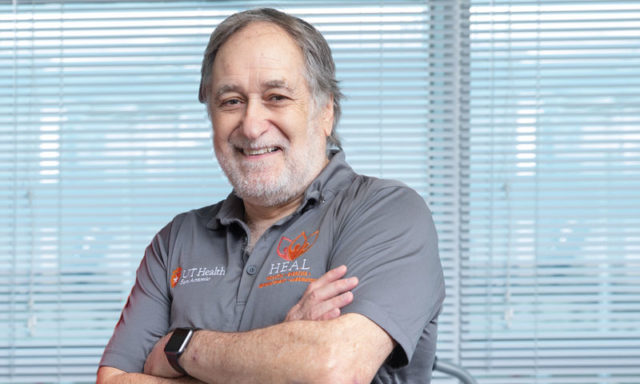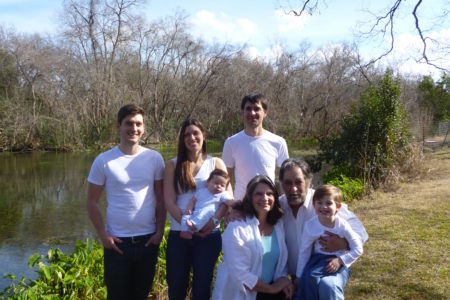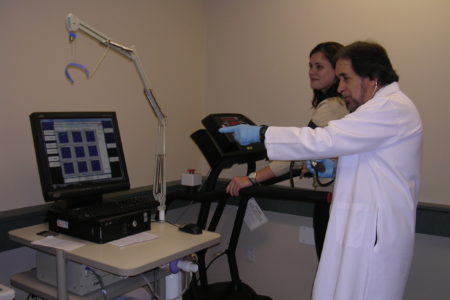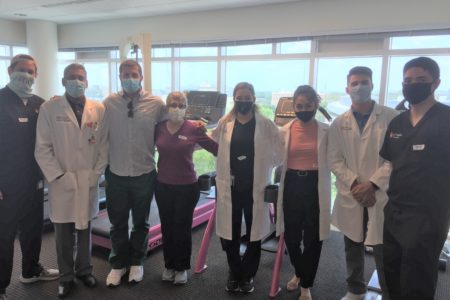
Share On Social!
Daniel Carlos Hughes thought he wanted to be a chemical engineer.
He worked at Dow Chemical for 23 years, moving up to a middle management position.
But then he had a midlife crisis.
Now he works as a kinesiologist focuses on sport and exercise psychology. He researches holistic interventions for cancer prevention and with an emphasis on exercise and stress in Latina breast cancer survivors as a faculty member of the Institute for Health Promotion Research (IHPR) at UT Health San Antonio.
While the career switch was risky and required many years of schooling, Hughes is glad to have found a calling where he can help cancer survivors live longer, fitter, better lives.
Hughes, a First Generation Mexican American in His Second Career
Hughes was born in Mexico City. His family immigrated to the United States when he was 9 years old.
“I’m really first-generation, and Spanish is my first language. In fact, when I came to the U.S., I didn’t know any English whatsoever,” Hughes said.
He pursued a degree in chemical engineering.
He then spent over 20 years of working at Dow Chemical. But he realized he needed a change.
“The reality is I went through a midlife crisis, as they say. I decided to switch careers, and went from a very good paying job, a middle manager at Dow Chemical, to a no-status grad student over a weekend,” Hughes said.
While many factors were involved in the career switch, a major aspect was the death of a coworker at Dow Chemical.
“I had a colleague that I worked with, we were hired on the same day, and he died from cancer. And there’s no doubt in my mind, that the reason he did is because of the stress that he put himself under the job, and he had no way to relieve it,” Hughes said.
It sparked a desire to learn more about stress and cancer.
“When I saw him being rolled down in his casket and the funeral mass, I remember thinking to myself, this is a tragedy, and it really didn’t have to happen. If he had had a way to really deal with the stress he was under, he wouldn’t be there right now,” Hughes said.
The death of his colleague, along with Hughes’ own stress, made him look into graduate school.
“I’d like to tell you that I had a real laid out plan and well laid out plan. But the reality is, I just knew I needed to get out of doing what I was doing, because it was driving me crazy,” Hughes said.

He knew his interests were in stress, cancer, and exercise, and that exercise was a good way to alleviate stress. But he wasn’t sure what that meant for a career.
“My original intent was to just go to grad school and get a master’s degree in kinesiology. And when I got into U of H, I realized real quickly if I was going to do anything meaningful that I needed to get a PhD,” Hughes said.
Hughes stayed on at the University of Houston and pursued a PhD in Kinesiology, writing his dissertation on exercise and stress in Latina breast cancer survivors.
After completing his PhD, Hughes did his postdoc at the MD Anderson Cancer Center in behavioral sciences with an R-25 Fellowship, where he sought to continue his work with Latino cancer.
“While I was at MD Anderson, I still wanted to work with Hispanics and Latinos and breast cancer and put those things together. So I submitted and got a pilot grant while I was there to do a study in Puerto Rico and Houston with exercise, stress, and Hispanic breast cancer survivors,” Hughes said.
Later, when receiving a K01, a research career development award, Hughes was introduced to Dr. Amelie Ramirez, the director of Salud America! and its home base, the Institute of Health Promotion Research (IHPR) at UT Health San Antonio.
“Dr. Ramirez said, ‘Hey, maybe you ought to think about coming to work here and bring your K01 with you,’” Hughes said. “And that’s exactly what I wanted to do, work with cancer-related health disparities, Latinas, and Latinos. So fortunately for me, I was able to get moved to work with Amelie here in IHPR in 2009, and then started to work here.”
In addition to his work at IHPR, Hughes teaches at Rice University in Houston as an adjunct assistant professor. In the spring, this means Hughes commutes back and forth between San Antonio and Houston most weeks.
“I teach understanding cancer in the spring semester, and also occasionally teach health disparities in America and their rise, and also do a little teaching with doctoral physical therapy students with research methods,” Hughes said.
Hughes and His Current Work at IHPR
Hughes’ focus and expertise are in integrative oncology, holistic approaches, and cancer survivorship.
“I just completed a pilot that was awarded to me from the Mays Cancer Center for doing holistic exercise interventions to optimize health related quality of life for adult cancer survivors. And so we’re doing that and I’ve got several grants under submission review for continuing that and make them a little bit broader and deeper and further funding,” Hughes said.
He has helped lead several successful studies on cancer recovery and survivorship.

“One of the things that we did in MD Anderson, which I’m especially proud of, is we actually did kind of a pilot study where you had people that suffered heart failure as a result of chemotherapy because chemotherapy is rough on a lot of things, including the heart, so patients, survivors may develop heart failure as a result of chemotherapy years after the fact. And so we did a pilot study for rehabilitation with very specific exercise programs for heart failure patients and we were successful,” Hughes said.
For that study, Hughes worked together with Dr. Daniel Lenihan, who was the principal investigator and in the cardiology department at MD Anderson at the time.
“He and I had this vision that this works for any survivor, really doesn’t have to be specifically type three, or HER2-positive breast cancer, really anybody can benefit that has any history of cancer. So he had this vision of that we would open up the doors and just allow anybody to come in, and we would do an assessment program for him, and we would benefit him. And I really loved that idea,” Hughes said.
While both Lenihan and Hughes have moved on from the project since then, Dr. Ruben Mesa, the executive director of the Mays Cancer Center at UT Health San Antonio, shares the same vision.
“This positive study that we did is really the first approach to do that, because we opened the doors to any adult survivor that wanted to join in, regardless of treatment status. And we want to prove that our approach would work in a heterogeneous survivorship population, because every survivor has a different starting point and therefore a different trajectory of where they can be in terms of physical, mental, spiritual,” Hughes said.
Now Hughes hopes to carry on the vision to have the Mays Cancer Center treat any cancer survivor individually and holistically.
“One of my primary goals is in the Mays Cancer Center, create such a vision that we had, where any survivor can walk in the door, and then we will give them a an Assessment Program and holistic program that would benefit. That’s what we’re trying to drive towards. And Dr. Ramirez supports that vision as well,” Hughes said.
Hughes Faces Challenges with COVID-19 and Grant Funding
Hughes has faced some challenges with his work, especially as the COVID-19 pandemic hit.
It forced him to change his pilot study, which takes a holistic approach to improve cancer survivors’ quality of life, thanks to $50,000 in funding from the Mays Cancer Center at UT Health San Antonio and SA Cancer Council Circle of Hope.
“The pandemic really kicked us kind of hard. In fact, when we did the pilot study, we wanted to do group-based yoga, because there’s something very important that really works well with social connectedness, in terms of what we were trying to do with our holistic approach. We worked real, real hard to get approval to be able to bring you our survivors into the Mays Cancer Center and conduct our yoga sessions there. So we got the study started, we actually did one week and then the pandemic hit, we had to disperse,” Hughes said.
Like many people in the early weeks as COVID-19 spread, Hughes was optimistic that the pandemic would be over quickly.
“I told my participants, ‘This will probably blow over in about three or four weeks, then we can reconvene, and everything will be great.’ But it didn’t. And then we had to decide what we were going to do. We decided we would try to continue the study through a telehealth application, and we did live stream and recordings,” Hughes said.
In addition to the pandemic, other challenges that Hughes has faced are with resources like personnel and funding.
“I lost my research coordinator over a weekend, because she was in Air Force Reserves, and she got called in. Fortunately for me, I had colleagues like Dr. [Patricia] Chalela [of the IHPR at UT Health San Antonio] that helped me with the resources and other colleagues that jumped in to help, so we got it done,” Hughes said. “Funding and getting funding, it’s always a challenge. And you have to keep submitting, submitting, submitting, submitting, submitting, and submitting some more because you don’t get funded as near as many times as you get rejected.”
Hughes is thankful the support he has had from mentors like Dr. Ramirez and Dr. Lorenzo Cohen, the director of integrative oncology at MD Anderson.
Hughes and His Goals for Future Research
In future research, Hughes wants to continue his current work on cancer survivorship and holistic interventions for Latinos.
“I can tell you that there’s really three things I’m trying to do. Number one is the survivorship, rehabilitation, prehabilitation. The second is to land an R01 to really continue the research that we started, focused on disparate populations, the South Texas-Mexico border, offered in language of choice for a holistic intervention,” Hughes said.
His third goal is to publish a paper that proves that stress can cause cancer.
“Stress promotes cancer progression. But the actual current thinking is that it’s not a carcinogen, does not damage DNA in the cells. But with Dr. Cohen’s support, and some of the data that we’re seeing, and some of the research we’re seeing, I want to prove otherwise. I can tell you that every survivor that I’ve had walk through my lab has told me that something happened previous to them getting cancer, maybe a year or two years, six months, but a major event, death of a spouse, death of a child, divorce, loss of a job,” Hughes said.
Ultimately, these future areas of research will help Hughes fulfill his goal to make cancer recovery a holistic practice.
“We’re really trying to change the paradigm of how survivorship is viewed,” Hughes said. “Instead of, ‘an inch wide and a mile deep,’ you know, ‘a mile wide and a mile deep,’ and really bring in everything we know about integrative oncology, not just physical, but mental and spiritual.”
By The Numbers
142
Percent
Expected rise in Latino cancer cases in coming years
This success story was produced by Salud America! with support from the Robert Wood Johnson Foundation.
The stories are intended for educational and informative purposes. References to specific policymakers, individuals, schools, policies, or companies have been included solely to advance these purposes and do not constitute an endorsement, sponsorship, or recommendation. Stories are based on and told by real community members and are the opinions and views of the individuals whose stories are told. Organization and activities described were not supported by Salud America! or the Robert Wood Johnson Foundation and do not necessarily represent the views of Salud America! or the Robert Wood Johnson Foundation.



